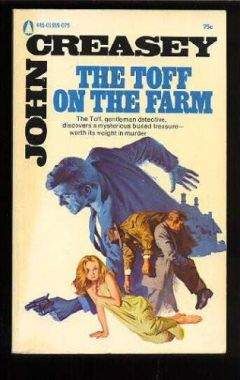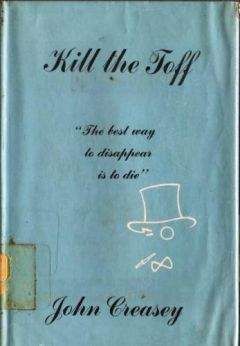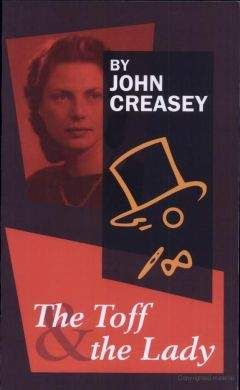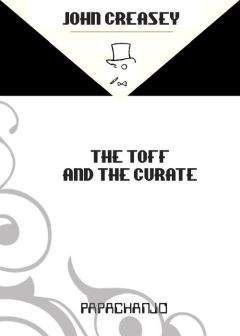John Creasey - The Toff and The Sleepy Cowboy
He pressed the bell but could not hear the ringing.
People passed in the street; cyclists passed; and motorists. But all of them seemed far off and remote, although they were within earshot. He heard footfalls on the other side of the door, heard the handle turning, next a faint creak as the door opened. A man in his late twenties stood there, sufficiently like Pamela Brown for Rollison to think: it’s her brother. The man was pale and uneasy.
“I’m Richard Rollison,” Rollison said, pleasantly. “I’ve come to see how Miss Brown is. I do hope she’s better.”
“She — she is all right,” replied the other. “I’m her brother. Please —” he seemed to gulp. “Please come in.”
He stood to one side.
Beyond him was a large hall, with a streak of vivid sunlight coming through on one side and what looked like the shadow of a man’s head and shoulders against the light where it struck a wall of pale-colour. Rollison could see a staircase, rising on one side; this much wider than most, with oil paintings, furniture and tall doors.
He stepped inside.
Before he was past young Brown, before he could see clearly about the hall, a man cried in a hoarse, penetrating voice:
“Get out, get out! They’ll kill you I Don’t come in !” Several things happened at once.
A man, out of sight until then, slammed the door so that Rollison was shut inside, and at the same moment gave young Brown a savage kick which made him gasp, stagger, and fall. Another man, at the head of the stair-case, began to fall. Rollison could not see more than his tumbling figure but he felt sure this was the older Brown. This man reached the bottom of the stairs and fell in a heap, breathing heavily, and making no attempt to get up. Still another man appeared at the head of the stairs, holding a gun. He was Hindle ! And although he did not look round Rollison sensed that the man who had been behind the door also had a gun.
Hindle reached the foot of the stairs and said, sneering : “Come into our parlour.”
“Said the spider to the fly,” Rollison capped with hardly a pause. “And before either of you make the mistake of using a gun on me, let me remind you of the oldest and simplest trick of all. I left a letter with the Editor of the Globe this afternoon, to be opened only if I died. I assured him it meant nothing while I was alive but would be the scoop of his lifetime if I were to die by violence today, or even fail to reappear by eight o’clock this evening. But you must be businessmen as well as rogues,” he added, lightly. “As businessmen, why don’t we talk?”
19
Business
CLEARLY, HIS REMARK was the last thing either of the men expected. Hindle, stepping from the shadows at the foot of the stairs, was suddenly struck by a shaft of sunlight which turned him into gold. The brilliance dazzled him. If ever there was a chance to turn the tables it was now, but Rollison did not attempt to, and the man from behind the door ordered:
“Don’t move.”
Young Brown was now in a huddled heap on the floor. His father still lay, unmoving, at the foot of the stairs. He might be unconscious; or he might be dead of a broken neck.
Hindle stepped out of the vivid light, into the shadow; and he became again a grey shadow of a man.
“Talk?” he echoed. “What have we to talk about?”
“Enough,” Rollison said.
Hindle stared, puzzled, but did not move his gun, and Rollison was right in the line of fire. Except for young Brown’s gasping there was no sound, until suddenly a thud came from upstairs, footsteps sounded, a door banged. At the head of the stairs, Pamela Brown ap-peared; another shaft of sunlight struck her face, so that it seemed to make a physical barrier she could not pass.
“Watch her!” Hindle ordered the man by the door.
“Oh, Daddy, Daddy!” Pamela cried, and she ran downstairs through two of the shafts of sunlight, a beautiful vision. She flung herself by the side of the man on the floor, and began to talk to him, urgently, fiercely. “Don’t die, oh, please don’t die.” She had his head in her lap and her forefinger was on his wrist. “He needs a doctor,” she cried. “You must send for a doctor!”
Hindle rasped: “Shut up.” He was looking at the Toff, when he went on: “Come on, tell me. What have we got to talk about?”
“The split,” Rollison said.
“The split,” breathed Pamela in a horrified voice.
“Are you crazy?” Hindle rasped.
“Not yet,” Rollison said. “There are several of you, including your wife. I’ll go sixty-forty. You have the sixty.”
“You are crazy!” cried Hindle.
“It doesn’t matter whether I’m crazy or not,” Rollison said. “If I’m not out and about, free as the air, at eight o’clock this evening, the Globe will know where to find Alec George King.”
Hindle drew in his breath, as if something hurt him. “He’s not here, no one could find him.”
“After what’s happened this morning, no plea of innocence will help you. If King isn’t here you know where he is.” Rollison paused before going on: “For a forty per cent cut I’ll keep my information to myself, but always with a ‘to be opened on my death’ letter with my bank manager. You’ll have to pray that I live long enough for you to enjoy your share.”
From behind Rollison the younger man breathed: “Who would believe this?”
From her father’s side, Pamela Brown said in a whispering tone which held horror tinged with unbelief : “Oh, no, no, no. Not you.” She was staring at the Toff, her eyes filling with tears. The new shock had superseded even that caused by her father’s crumpled body.
Rollison said in a brisk voice : “Don’t be silly, Pamela. You’re a big girl now. If you want to help your father, ‘straighten his body and his arms and legs and check for broken bones. You needn’t worry, all you and your precious family have to do is keep quiet.”
“Oh, dear God,” Pamela said huskily; but at least she began to do as she was told, easing her father’s head from her lap and gradually straightening his body. He lay limp, and did not open his eyes or utter a sound.
Hindle breathed : “Was I wrong about you, Toff.”
“A lot of people are wrong about me,” Rollison said, off-handedly. “You can get away with this and sixty per cent of the Clayhanger inheritance, or you can get away with nothing. Even the satisfaction of killing me won’t help.”
“You can’t have known we were involved,” said Hindle, with a catch in his voice.
“Of course I knew,” Rollison replied testily. “If you weren’t pretty certain that I realised what you’d done, why should you be so intent on killing me? The bombing was as effective a way as you could think of, and dis-tracted the police who thought I was involved with a terrorist organisation.”
“They did!”
“They did. Tell me,” said Rollison. “How did you get hold of the motor-cyclist?”
“He’s a friend of my son.”
“Your son? This chap?” For the first time, Rollison turned to look at the man who had been behind the door and who was still covering him with a gun. “You really meant to keep it in the family, didn’t you?”
“That’s where it belongs,” Hindle said, waspishly.
“Pop,” said young Hindle, “he’s talking too much.”
“I don’t know, Derek,” said Hindle, slowly. “If he’s telling the truth —”
“I’m telling the truth,” Rollison interrupted.
Out of the corner of his eye he saw young Brown move. He did not know whether the Hindles saw it, and waited, watching Hindle and seeing the girl who was now beyond him. She was smoothing her father’s forehead, and there was no way for Rollison to know how the man was. But when she glanced up the loathing in her eyes, at sight of him, showed just how she felt towards the man whom she had virtually hero-worshipped.
So, he had convinced her.
He thought he had convinced the Hindles. If he had, then he still had a chance in spite of the two guns. But if young Brown leapt at Derek Hindle he, Rollison, would not have a chance; shooting would start.
He caught a glimpse of young Brown, face turned towards him. That face resembled Pamela’s even more, perhaps because the expression of loathing for him, the Toff, was exactly the same. And young Brown was beginning to tense himself, to make some move.
Rollison said roughly: “Watch Brown!”
Derek swung round as the other tried to scramble to his feet, but Brown did not have a chance. For an awful moment Rollison thought Derek would shoot him; instead, he took two long strides and kicked him, savagely. Pamela cried out. Her brother fell back, in agony, Derek Hindle grinned as if the act of causing pain had given him pleasure.
Then Pamela flung herself on Hindle.
He was taken so much by surprise that she was able to grip his gun arm and twist. He yelped with pain and the gun flew from his grasp. Pamela darted towards it, and at that moment Rollison could have dealt with Derek, could have turned the tables completely. Instead, he moved with startling speed across the room and reached the gun, kicked it out of Pamela’s reach, and, when she turned and flew at him, eyes blazing, trying to scratch his face, gripped her so tightly that the breath actually hissed out of her body. For a split-second his lips were close to hers and he whispered:
“Keep this up. I need half an hour.”
For a scarcely perceptible moment she went still; then suddenly she became a screaming, writhing shrew of a woman, kicking, kneeing, clawing, scratching, until at last Derek Hindle pulled and flung her away.
Rollison dabbed a cut in his cheek, watching Derek frogmarch the girl to a cupboard under the stairs and the father force young Brown to the same place. There was a vicious streak in Derek Hindle; he slammed the door to try to catch young Brown’s fingers, but Brown snatched them away in time. All the men now in the hall were breathing hard — except Brown senior, who lay so still. Rollison went down on one knee and felt his pulse.
“Forget the old fool,” Derek rasped. “He hasn’t long to live, anyhow.”
“Someone ought to tell your son Derek that you can buy silence, you don’t have to kill,” Rollison said.
“You couldn’t buy the Browns,” retorted Hindle.
“They’d keep quiet if their daughter was married to Thomas G. Loman of Tucson, Arizona, heir to a million-plus-pounds, not dollars.” Rollison infused some light-ness into his tone. “Everyone involved will keep quiet. You two have to get out of the country soon — presum-ably you have false passports?”
“We’ve got it all arranged,” said Hindle.
“How much do the Browns know?”
“Nothing that matters, except that we took their house over, and what’s happened today,” Hindle answered.
“What made you come here?” asked Rollison.
“We didn’t know how much Pamela Brown knew and had to find out. And knowing you, we thought you would probably come to see her in your great hero act.” Hindle gave a cackle of laughter.
“What about —?” began Rollison.
“To hell with your questions!” rasped Derek Hindle. “Pop, I say he’s lying.”
“I shouldn’t put it to the test,” Rollison warned.
They stood in silence for a few moments which seemed to drag out into minutes, and when a sound came it surprised Rollison but did not trouble the others. It was a woman’s voice, from upstairs. Rollison glanced up to see Hindle’s wife at one side of the landing leading to the staircase. She looked as meek and frail now as she had at Rubicon House, but what puzzled Rollison was the pair of field-glasses which dangled from her neck on to her flat chest.
“Arthur,” she called, “I’ve finished.”
“Have you seen anyone,” called Hindle.
“No, dear. I’m absolutely sure no one’s hiding any-where within sight of the house. I’m sure I would have seen them. I’ve focused on every car and every tree, and if the house was surrounded I’d see some of the watchers, wouldn’t I ?”
“Yes, you’d see some of them,” Hindle agreed, with deep satisfaction. “So you didn’t bring the police, Rollison.”
“I wouldn’t want the police to know how deeply and in what way I was involved,” Rollison pointed out.
Hindle cackled again, and even Derek grinned; and for the first time, both men lowered their guns. The woman looked down over the balustrade, the field-glasses dangling.
“What’s been happening down there?” she called.
“Rollison’s come to make a deal,” explained Hindle. “Don’t worry your head about it, Lou, just keep an eye on those windows.”
“Where’s the girl?” demanded Hindle’s wife. “She picked the lock with a hairpin, the pin’s still in the door. I couldn’t help it,” she added querulously. “I was making sure the house wasn’t watched.”
“It certainly wasn’t your fault, Lou,” said Hindle, soothingly. “You don’t need to worry any more.”
She said: “That’s good, Arthur,” and turned away.
Rollison continued to look upwards until he saw that she was no longer on the landing or the passages, so she must be in one of the rooms. The two Hindles were more relaxed than Rollison had yet seen them, Derek the more wary; Hindle himself gave the impression that he had rid himself of a great burden.
“I’ll make a deal with you at seventy-five to us, twenty-five to you,” he said; and sneered: “So this is how you make your money!”
“It’s one way,” Rollison answered. “I’ll settle for one-third.”
Derek said angrily : “There are three of us, as well as Ma.”
“Derek,” said his father, “the Toff can help us a great deal. He can smooth away a lot of difficulties, and I don’t want any more argument. I’ll settle for two-thirds, Rollison.”
“That’s good,” Rollison said softly.
“How can we be sure he’ll keep his word?” demanded Derek. “It will be a long time before Alec —” he nearly choked —”a long time before Tommy gets his money. How do we know we’ll get our share?”
“That’s just what I mean,” said his father. “We’ll have an agreement made out between us, and we’ll have a tape recorder record, too. We’ll have the Toff as tight as he’s got us. He’ll vouch for Alec being Tommy Loman, he’ll help to get everything settled quickly with probate. How about that — a man with an unassailable reputation like the Toff won’t have anything to worry about. It couldn’t be better, Derek.”
“He’s not going to leave here until he’s signed a confession,” Derek insisted.
“We all sign one,” Rollison interposed. “And we all put the same confession on tape, too. When we’ve all got copies we’ll be able to trust each other.” He slid his hand into his pocket and took out his cigarette case, selected a cigarette as if casually, but actually made sure it was one of those which contained a phial of tear gas. He put the cigarette to his lips and slid the case back into his pocket. “Why don’t we get down to business?” He took out a book of matches, aware that Derek was watching every movement he made very closely, and laughed : “I still don’t know how you fixed Alec George King. He threw me and the police off the scent.”




